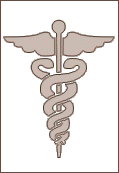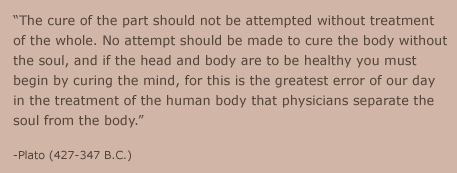

This despair from medical community has infiltrated in the society at every level. Patients have become accustomed to relinquishing control of their health to the ‘medical establishment’. Medical establishment has become compartmentalized into doctors, technicians, research scientists and pharmaceutical companies and healthcare management corporations. The current system seems to work in parts. Doctors first rely on the technicians to affirm their disease diagnosis, later they rely on the scientists at the pharmaceutical laboratories for solutions to those diseases. The scientists in turn rely on their research based on cellular level and performed either on animals or on large groups of diseased individuals. They are rarely if at all ever in contact with any patient. The pharmaceutical companies provide the incentives to the scientists for their continued work as well as reach out to the patients to ask their doctors for the medication that they are manufacturing. The healthcare management companies manage the financial part of health care and govern the doctors in financially appropriate procedures.
Together these branches are expected to function efficiently to provide comfort, higher functioning and health for the patients. The medical establishment is able to provide some level of comfort, a sustained level of functioning but unfortunately, a very poor state of health. More patients are recommended to live with the disease as best as they can with increasing dependence of medications to sustain the comfort and functionality. The fact that each of us is a unique individual capable of responding in a unique manner to diseases and life circumstances is lost in this elaborate multi level process to find solutions to diseases.
In addition, the modern medical system revolves around the assumption that symptoms are diseases and most diseases are the results of germs, poisoning or stress from outside. This theory promotes the misconception of diseases as an external entity; it also enhances the fear as well as despair because we are merely human beings unable to insulate ourselves from surrounding. Billions of dollars are spent to study these entities called germs and yet these germs mutate and transform themselves over time, making it an almost impossible situation to succeed in. Massive research efforts are made to link all known pathologies to microorganisms, resulting in the unreal expectation – ‘eradication of the organisms will eradicate all possibilities of development of pathologies’. When this is not achieved, false immunity is then generated against the microorganisms through vaccination, which often results in dysfunctional immune system leading to auto-immune diseases or allergy.
The medical education also revolves around learning more about disease rather than health. Most time is spent in teaching the medical student how to diagnose, label and annihilate the symptoms and their ‘external’ causes with chemical drugs, rather than observing the role of symptoms in the healing process and preserving health. They are also asked to join in the despair of the current situation by learning to remove and discard the organ that is diseased.
Thousands of routine tonsillectomies, appendicectomies, cholecystectomies (removal of gall bladder) and hysterectomies (removal of uterus) are performed each year because these organs become ‘troublesome’ and/or ‘unnecessary’.
Obviously, in the intense desperation and despair, the priceless fact is lost, that the human body is equipped with a marvelous system of repair and self-preservation. This healing system is active throughout the lifetime of the individual. It is capable of restoring the individual’s own rhythm and balance if it is given a chance. Instead of supporting and assisting our body’s innate self-healing ability, however, we through modern medicine, do our best to extinguish it under a deluge of medications. Such measures merely serve to suppress the healing ability rather than cure any illness.
Just as fragmented the medical establishment is, the prominent medical view is that the human body is a mere conglomeration of its fragments - organs. Each organ is perceived as an independent entity, with little or no connection to the rest of the body or individual being. The whole is forgotten in the face of its parts.
A totally misguided belief is perpetuated that an individual’s sickness or health is dependent only upon the relative sickness or health of his or her various organs. This view leads to the notion that each organ requires to be cared by a specialist who is a master at resolving complaint of that organ. It seems logical in theory, however, we are not just sum of our organs and health does not emanate from the relative health of every organ. If this was true, all of us whether we are medicated or not must experience highest level of health at all times.
In practical reality, such scenario doesn’t exist. Medicated patients often regain the function that was lost due to the disease process, but they do not experience health as it is commonly defined, or described by the World Health Organization. The World Health Organization describes health as a state of complete physical, mental and social well-being and not merely the absence of disease or infirmity. In a familiar phrase, it means that the overall health is more than the sum total of the health of its parts. It is also more than a mere absence of symptoms.
How often does it happen that before any symptoms develop from a ‘sick’ organ, the patient experiences a state of discomfort, or dis-ease? If close attention is paid, it will be revealed that a state of ‘unease’ is always experienced prior to any actual reduction in the function of an organ through symptoms. The symptoms come after this state of unwell being experienced at an individual level, a general level rather than an organ level. If we intervened at this junction and helped the individual, the individual has a better chance of regaining a sense of well-being even before the organ is compromised with a disease process. Thus total health is achieved, experienced and sustained at both levels – general as well as organs. Prevention is much easier than treating disease process.
Homeopathy has been known for bringing back this level of health. Its efficacy has been widely recognized in helping individuals regain total and complete health slowly but surely.